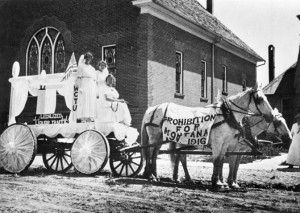
Founded in 1883, the Montana chapter of the Woman’s Christian Temperance Union (WCTU) was a popular, well-organized women’s club focused on reducing the consumption of alcohol in the state. Part of a broad series of reform movements that swept the country at the turn of the century, the WCTU was witness to women’s growing political power in the area of social reform.
The national WCTU was founded in Ohio in 1873 and quickly gained a broad base of support around the country. Like their national counterparts, Montana women joined the WCTU because they believed that limiting access to alcohol would in turn reduce the incidence of other social ills, such as gambling, prostitution, and public and domestic violence. In addition to advocating temperance (and later complete prohibition), Montana WCTU members also worked for a broad range of social reforms. At their state convention in Billings 1910, for example, the members voted for resolutions that “urged enforcement of juvenile court law [and] government aid to destitute mothers, . . . condemned the use of coca-cola, and recommended sanitary fountains.”
In her study of the WCTU and similar women’s clubs in this period, historian Stephenie Ambrose Tubbs argues that Montana women enjoyed a “growing sense of social and political power through their clubs’ active participation in social and civil affairs.” By asserting their role as reformers, the middle-class women involved in the Montana WCTU were restructuring ideas about femininity and women’s role in the public sphere. They challenged the traditional idea that a woman’s place was in the home, suggesting instead that society had become so morally corrupt that it required women’s political participation. They drew on the Victorian idea of women’s natural moral superiority to make the case that women had to take the lead in reform. Continue reading Cultivating Female Reform: The Montana Woman’s Christian Temperance Union